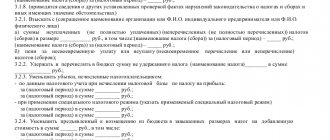Deadline for filing objections to the on-site tax audit report
As of 12/18/2020
Moscow Tax lawyer Gordon A.E.
The tax audit report is drawn up by the tax authority based on the results of the tax audit (Article 100 of the Tax Code of the Russian Federation). An objection to the tax audit report is filed by the taxpayer if the taxpayer does not agree with the results of the audit in whole or in part. It is the right of the taxpayer to submit an objection to the act (Article 21 of the Tax Code of the Russian Federation). The Tax Code of the Russian Federation provides for two types of tax audits - desk and field (Article 87 of the Tax Code of the Russian Federation). For field tax audits, drawing up a tax audit report is a mandatory procedure; for desk audits, a tax audit report is drawn up only if violations are detected.
EXAMPLE No. 1
The taxpayer received an on-site tax audit report on May 30, 2016. The deadline for filing objections to the received report is no later than June 30, 2021.
The taxpayer has the right to attach to written objections or, within the agreed period, submit to the tax authority documents (their certified copies) confirming the validity of his objections (clause 6 of Article 100 of the Tax Code of the Russian Federation).
Written objections and supporting documents are sent to the tax office that conducted the audit (clause 6 of Article 100 of the Tax Code of the Russian Federation).
Objections can be served in person or sent by mail. Then the period (month) will be counted from the seventh day from the moment of sending the registered letter (clause 5 of Article 100 of the Tax Code of the Russian Federation).
SERVICES IN THE ARBITRATION COURT
Deadline for objections to a tax audit report
Desk tax audit - objections to the report due date
According to the rules of Article 100 of the Tax Code of the Russian Federation, in the event of violations of the legislation on taxes and fees during a desk tax audit, a tax audit report must be drawn up within 10 days from the date of completion of the audit, and then, within 5 days, the report must be handed over to the taxpayer being audited ( Part 1 and Part 5 of Article 100 of the Tax Code of the Russian Federation).
Note #1:
Any deadlines in tax legal relations are calculated according to special rules specifically established in the Tax Code of the Russian Federation. The general rules for calculating time limits for tax purposes are established in Article 6.1 of the Tax Code.
Deadlines in the Tax Code can be set in years, quarters, months, days. The rules for calculating deadlines are disclosed in the relevant parts of Article 6.1 of the Tax Code of the Russian Federation. It is important to remember two basic rules for calculating deadlines: 1) The deadlines established (calculated) in the Tax Code in days are calculated in working days (Part 6 of Article 6.1 of the Tax Code of the Russian Federation). 2) The period begins the next day after the calendar date or the occurrence of an event (action) that determines its beginning (Part 2 of Article 6.1 of the Tax Code of the Russian Federation).
Taking into account the rules of Art. 6.1 of the Tax Code of the Russian Federation, the calculation of the deadline for submitting objections to the tax audit report is carried out in the following order. The taxpayer has the right to submit written objections to the tax audit report within one month from the date of receipt of the report. (Part 6 of Article 100 of the Tax Code of the Russian Federation).
The beginning of the period is determined from the next day after the occurrence of the event (Part 2 of Article 6.1 of the Tax Code of the Russian Federation). For filing objections to a deed, the event is the delivery of the deed. As a rule, the Tax Audit Report is delivered to the taxpayer personally (or his representative) or sent by mail (Part 5 of Article 100 of the Tax Code of the Russian Federation). The period expires in the corresponding month and day of the last month of the term (Part 5 of Article 6.1 of the Tax Code of the Russian Federation).
Note #2:
The date of delivery of the act depends on the method of delivery - in person or by mail. When personally delivering the act to the taxpayer (representative), everything is simple - the tax authorities use tax audit report forms of the approved form. Taxpayers sign on receipt of the act on one of the last sheets of the act, a copy remaining with the tax office . The date indicated in this receipt is the date of delivery of the act. Therefore, when receiving the act, duplicate the receipt of the act on your own copy!
PROTECTION OF THE TAXPAYER AT THE STAGE OF THE INSPECTION (CAMERA OR ON-SITE).
| The material was prepared by Law Firm Logos lawyer Timur Ismailov |
Protection of the taxpayer at the stage of a tax audit, as a form of pre-trial settlement of a tax dispute, includes the preparation and filing of objections to the tax audit report, participation in the consideration of tax audit materials.
The protection of the taxpayer at the tax audit stage can also include the submission to the tax authority of explanations on the calculation and payment of taxes, as well as on reports of tax audits, participation of the taxpayer’s representative in tax control activities, aimed at preventing violation of the taxpayer’s rights by the tax authority. According to Article 82 of the Tax Code of the Russian Federation, tax audit
is one of the forms of tax control, along with its other forms, such as obtaining explanations from taxpayers, checking accounting and reporting data, inspecting premises and territories used to generate income (profit).
There are two types of tax audits:
desk
audits (conducted at the location of the tax authority on the basis of tax returns and other documents available to the tax authority) and
on-site audits
.
On-site tax audit
carried out (as a rule) on the territory (premises) of the taxpayer based on the decision of the head (deputy head) of the tax authority.
Based on the results of the tax audit,
the officials who conducted it are required to draw up
a tax audit report
in the prescribed form. Currently, the form approved by Order of the Federal Tax Service of Russia dated December 25, 2006 N SAE-3-06/ [email protected] At the same time, based on the results of
an on-site tax audit
, a report must be drawn up in any case, and based on the results
of a desk audit
, in that case if the audit reveals
violations of the legislation on taxes and fees
, which follows from the norm of paragraph 1 of Article 100 of the Tax Code of the Russian Federation. In accordance with paragraph 2 of Article 100 of the Tax Code of the Russian Federation, the Tax Audit Report is signed by the persons who conducted the relevant audit and the person in respect of whom this audit was carried out (his representative).
On the refusal of the person in respect of whom a tax audit
, or his representative sign the act, a corresponding entry is made in the tax audit report.
All facts of violations of the legislation
on taxes and fees identified during the inspection must be reflected in the act, and the Act must contain documented facts of violations of the legislation on taxes and fees identified during the inspection, or a record of the absence of such, which follows from subparagraph 12 of paragraph 3 of article 100 of the Tax Code of the Russian Federation.
the tax audit
act is the date the act was signed by the persons who carried out this audit, which follows from subparagraph 1 of paragraph 3 of Article 100 of the Tax Code of the Russian Federation.
In accordance with paragraph 5 of Article 100 of the Tax Code of the Russian Federation: Tax audit report
within five days from the date of this act, it must be delivered to the person in respect of whom the inspection was carried out, or his representative against a signature, or transferred in another way indicating the date of its receipt by the specified person (his representative). If the person in respect of whom the audit was carried out, or his representative evades receiving a tax audit report, this fact is reflected in the tax audit report, and the tax audit report is sent by registered mail to the location of the organization (separate division) or place of residence individual. If a tax audit report is sent by registered mail, the date of delivery of this report is considered to be the sixth day counting from the date of sending the registered letter.
Together with the Tax Audit Report
the taxpayer must be presented with documents confirming the facts of violations of the legislation on taxes and fees identified during the audit (this follows from paragraph 3.1 of Article 100 of the Tax Code of the Russian Federation), with the exception of documents received from the taxpayer himself.
Thus, if inspectors in the Inspection Report substantiate their conclusions with references to documents requested from the taxpayer’s counterparties, interrogation reports, etc., all these documents (their copies, extracts) must be provided to the taxpayer himself. This provision is intended to provide the taxpayer with the opportunity to provide reasonable explanations on the circumstances identified during the audit. From the moment of delivery of the Act, the period for submitting written objections to the tax audit report to the tax authority (the body that conducted the audit) is calculated. The right to submit such objections is established by paragraph 6 of Article 100 of the Tax Code of the Russian Federation.
The period for filing objections is fifteen working days and begins to run the next day after delivery of the Act, and expires on the last day of the period, which follows from the norms of paragraph 6 of Article 100 and paragraphs 1,2,6 of Article 6.1 of the Tax Code of the Russian Federation. An example of calculating the period: The tax audit report was delivered to the taxpayer on October 24, 2011. The deadline for filing objections begins on October 25, 2011 and expires on the fifteenth working day (the last day of the deadline). October 25-28 – 4 working days, included in the deadline. October 29, 30 – weekends, not included in the deadline. October 31, November 1-3 – 4 working days, included in the deadline. November 4-6 – weekends and non-working holidays are not included in the deadline. November 7-11 – 5 working days, included in the deadline. November 14, 15 – 2 working days, included in the deadline. 4+4+5+2=15. Thus, the deadline for submitting written objections to the tax audit report
, delivered to the taxpayer on October 24, 2011, expires on November 15, 2011.
From the moment of expiration of the above period (the deadline for submitting objections to the tax audit report), the period for the tax authority to make a decision based on the results of the tax audit (decision to bring to tax liability, to refuse to bring to tax liability) is calculated. This period is 10 days, but can be extended (by no more than one month), as follows from paragraph 1 of Article 101 of the Tax Code of the Russian Federation. Before the expiration of the deadline for the taxpayer to submit objections to the tax audit report (15 working days from the date of delivery of the report), the tax authority does not have the right to make a decision on the results of the tax audit. A decision made by the tax authority before the expiration of the specified period may be canceled by a higher tax authority, or declared invalid by the court due to a violation of the procedure for considering tax audit materials (clause 14 of Article 101 of the Tax Code of the Russian Federation), which is confirmed by extensive judicial practice, in particular the Resolution of the Federal Arbitration Court of the East Siberian District dated September 27, 2010 in case No. A78-7296/2009, Resolution of the Ninth Arbitration Court of Appeal dated July 21, 2008 No. 09AP-6938/2008-AK in case No. A40-12127/08-76-52, etc. .
As for the need to comply with the deadline for submitting objections to the Act by the taxpayer, the following can be noted: The Law does not provide for the possibility of extending the deadline for submitting objections to the tax audit act
. At the same time, the law does not directly indicate the right of the tax authority to refuse to accept objections filed after the established deadline, but before the tax authority makes a decision based on the results of consideration of the tax audit materials.
There is judicial practice confirming the duty of the tax authority to consider objections submitted after the deadline, but before the inspection makes a decision (Resolution of the Federal Arbitration Court of the West Siberian District dated September 13, 2007 in case No. F04-5702/2007(37410-A70-29 ).
Taxpayer's objections
on the audit report can be drawn up in free form, since tax legislation does not establish formal requirements for their preparation. Objections must be motivated and contain a reasoned position of the taxpayer. The taxpayer has the right to attach to written objections or, within the agreed period, submit to the tax authority documents (their certified copies) confirming the validity of his objections to the tax audit report. After the deadline for submitting objections to the audit report has expired, the tax audit materials are reviewed.
Tax audit report
, other materials of the tax audit and additional tax control measures, during which violations of the legislation on taxes and fees were identified, as well as written objections to the said act submitted by the person being inspected (his representative) must be considered by the head (deputy head) of the tax authority that conducted the tax checking what is established by paragraph 1 of Article 101 of the Tax Code of the Russian Federation. Regardless of whether the taxpayer submitted written objections to the tax audit report or not, the taxpayer has the right to participate in the consideration of the tax audit materials, personally or through a representative, and has the right to give his explanations at the stage of consideration of the tax audit materials.
The head (deputy head) of the tax authority is obliged to notify the inspected taxpayer of the time and place of consideration of the tax audit materials, which follows from paragraph 2 of Article 101 of the Tax Code of the Russian Federation. In the event that the inspected taxpayer is properly notified of the time and place of consideration of the audit materials, but not appeared and did not send a representative, the tax authority has the right to consider the audit materials in his absence. However, the absence of proper notification of the time and place of consideration of the audit materials is the basis for declaring the decision of the tax authority invalid, which is confirmed by judicial practice, in particular the Rulings of the Supreme Arbitration Court of the Russian Federation dated 04/18/2011 No. VAS-12606/10 in case No. A13-14116/2009 , t 08.12.2010 No. VAS-15834/10 in case No. A03-7345/2009 and others.
of tax audit materials
, the head (deputy head) of the tax authority may decide to bring to tax liability or a decision to refuse to bring to tax liability, which is provided for in paragraph 7 of Article 101 of the Tax Code of the Russian Federation. But also, based on the results of reviewing the audit materials, he may come to the conclusion that it is necessary to collect additional evidence to confirm the facts of violation of tax legislation reflected in the audit report, or the absence of such violations. In this case, he decides to carry out additional tax control measures (clause 6 of Article 101 of the Tax Code of the Russian Federation), for a period of no more than a month.
After carrying out these activities, which can only be: requesting documents from the taxpayer being audited or his counterparties (and other persons), interrogating witnesses, conducting an examination, the tax audit materials are reviewed again, taking into account the results of additional tax control measures.
After reviewing the tax audit materials, taking into account the results of additional tax control measures, the head (deputy head) of the tax authority is obliged to make a decision on whether to bring or refuse to bring to tax liability. Re-appointment of additional tax control measures is not allowed.
By virtue of paragraph 4 of Article 101 of the Tax Code of the Russian Federation, the decision made based on the results of the audit must reflect, among other things, the arguments put forward by the person in respect of whom the audit was carried out in his defense, and the results of the verification of these arguments. Thus, the tax authority is obliged to evaluate the taxpayer’s arguments, including those set out in written objections to the Act, as well as those presented orally, during the consideration of the audit materials. These norms are intended to ensure the motivation and validity of the decision made by the tax authority.
The submission by a taxpayer of justified objections to a tax audit report in a number of cases can prevent the tax authority from making an unjustified decision that violates the rights of the taxpayer. The head (deputy head) of the tax authority, reviewing the audit materials, in some cases, may agree with the taxpayer’s arguments and, when making a decision, waive unfounded claims for additional assessment of taxes, penalties, fines, etc.
Along with the above forms of protecting the interests of the taxpayer
(submission of objections to the tax audit report, participation in the consideration of audit materials),
the protection of the taxpayer
at the stage of tax audits also includes the provision of explanations to the tax authority; representing the interests of the taxpayer during various tax control activities. In accordance with subparagraph 7 of paragraph 1 of Article 21 of the Tax Code of the Russian Federation, taxpayers have the right to provide tax authorities and their officials with explanations on the calculation and payment of taxes, as well as on reports of tax audits carried out.
In a number of cases, the provision of such explanations outlining the taxpayer’s position before drawing up the Inspection Report can prevent the inclusion of unfounded conclusions in the Inspection Report. Also, since at the stage of additional control measures there is no provision for drawing up a new Inspection Report, the taxpayer’s position at this stage can be expressed in the form of explanations, the drafting of which is also advisable to entrust to a professional lawyer.
Also, in a number of cases, it is advisable for a lawyer to participate as a representative of the taxpayer when carrying out tax control measures against him, for example, interrogations (receiving oral explanations). For a taxpayer summoned for questioning (or giving explanations about his financial and economic activities), it is advisable to consult with lawyers in advance, discuss possible questions and answers to them, so as not to give tax officials information that they can use against the taxpayer. The presence of a lawyer during interrogation is possible only if he has the appropriate powers and despite the fact that the person being interrogated must still answer the questions of officials. But the legal representative will be able to draw attention to procedural violations, which in the future may be grounds for challenging the results of the interrogation, and make appropriate comments in the protocol.
All this suggests that it is advisable for a taxpayer to seek qualified legal assistance already at the stage of conducting a tax audit. The sooner qualified lawyers are involved in this work, the more difficult it will be for tax officials to collect and prepare evidence to bring the taxpayer to tax liability, charge him additional amounts of tax, penalties, or refuse to refund tax amounts. The greater the likelihood that a decision that violates the interests of the taxpayer will either not be made by the tax authority at all or will be canceled or declared invalid in an administrative or judicial manner. Issue against the taxpayer
The decision to
bring to tax liability
or to refuse to bring to tax liability ends the tax audit stage.
After this, the protection of the taxpayer’s interests can be carried out in the form of appealing decisions administratively or judicially. At the same time, the stage of pre-trial settlement of tax disputes includes appealing decisions (actions and inactions) of the tax authority in an administrative manner (to a higher tax authority).
How to calculate the expiration date for filing written objections to an act?
According to the rules of Article 6.1 of the Tax Code of the Russian Federation, deadlines calculated in months expire on the corresponding month and day of the last month of the period. The article contains two clauses regarding the expiration date:
1) If there is no corresponding date in the month of expiration (for example, the 31st day, or “the end of February”), in such a month the period calculated in months ends on the last day of the month.
2) If the last day of the period falls on a weekend, non-working day, or holiday, the end of the period is considered to be the first working day following them.
Taking into account the rules of Part 6 of Article 100 of the Tax Code of the Russian Federation, it is possible to file objections to a tax audit report within one month, therefore, the period for objections to a tax audit report expires next month on the calendar date following the date of the month of delivery of the act.
For example:
The desk tax audit report was handed over to the taxpayer on December 28, 2021, taking into account the above rules of Articles 6.1 and 100 of the Tax Code of the Russian Federation, the deadline for objections to the report expires on January 29, 2021.
If the desk tax audit report was delivered to the taxpayer on January 29, 2021, taking into account the above rules of Articles 6.1 and 100 of the Tax Code of the Russian Federation, the deadline for objections to the report expires on March 1, 2021. (The period must expire on February 29, 2021, but this date is not available in 2021, therefore, the month period expires on the first following business day).
When to use the right
Your right to submit objections should be exercised, for example, if the taxpayer categorically disagrees with the conclusions made by the tax authorities and intends to defend his position before the head of the tax authority, in a higher authority or court. Practice shows that it makes no sense to focus only on formal violations during a desk audit (for example, violation of the inspection deadline). And there is no point in filing objections based only on formal violations. Moreover, this is inappropriate, since tax authorities will have the opportunity to correct minor shortcomings in a timely manner. Accordingly, the taxpayer will lose additional “trump cards”, because formal shortcomings can be pointed out in court. Thus, one should object only to those conclusions that are formulated in the descriptive and summary parts of the desk audit report. The taxpayer must understand that only a violation of the deadline for drawing up the act or the three-month deadline for conducting a desk audit will not prevent the IFTS from making a decision.
By shape
Objections are submitted in written and free form. They can be submitted: - to the desk inspection report as a whole; - to its individual parts (clause 6 of article 100 of the Tax Code of the Russian Federation). The introductory part shall indicate: - date of submission of objections; — name of the organization or full name. an individual; — location address for an organization or residence address for an individual; — TIN, checkpoint; — name of the tax authority to which the objections are submitted; - FULL NAME. and the position of the tax inspector who conducted the desk audit; — based on which declaration (calculation) the audit was carried out (tax, period); — start and end dates of the audit. The following are indicated: - objections to specific conclusions and (or) proposals; - the amount with which the taxpayer does not agree to be collected; - arguments of both sides - the taxpayer and the inspector. Arguments should be expressed briefly, clearly, with references to the Tax Code of the Russian Federation. The signature of the manager or individual, as well as a representative (if any), is affixed. A stamp is affixed (if available).
Required Applications
The taxpayer’s position can be strengthened by: - court decisions. These may be decisions of the relevant FAS or decisions of the Supreme Arbitration Court of the Russian Federation; - letters from the Ministry of Finance of Russia, the Federal Tax Service of Russia, the Federal Tax Service for a constituent entity of the Russian Federation or written explanations from the Federal Tax Service of Russia. But the correctness of the taxpayer is best confirmed by the relevant documents - accounting registers, “primary records”, etc. The documents are attached as certified copies. Necessary clarification: the taxpayer has the right to attach documents, but is not obliged to do so (clause 6 of Article 100 of the Tax Code of the Russian Federation). However, the availability of documents can significantly affect a positive decision. How legal is it to submit missing documents to a higher authority or court? The taxpayer, in support of his objections to the act, may submit documents and other evidence to the court, regardless of whether they were submitted to the tax authority within the established time frame (clause 6 of Article 100 of the Tax Code of the Russian Federation). The Supreme Arbitration Court of the Russian Federation indicated that the court is obliged to accept and evaluate the documents presented at the court hearing (clause 29 of the Resolution of the Plenum of the Supreme Arbitration Court of the Russian Federation dated February 28, 2001 N 5). This decision is still relevant, but this position is not applicable if the documents were already requested by the Federal Tax Service during the inspection, but were not submitted to the inspectorate before the decision was made without a good reason. For example, the following may be considered valid reasons for non-submission of documents: - there is no evidence that the tax authority sent the taxpayer a request to submit documents; - there is no evidence of proper delivery of the demand; - documents were confiscated; - the request was not received due to the fault of postal employees, etc.
How to write objections
If you do not agree with the facts stated in the tax audit report or in the tax violation report, you have one month to submit written objections. The period begins to run from the day you received the act.
Before writing objections, you need to decide what exactly you disagree with: will you challenge the act in its entirety or some parts of it; whether your objections relate to procedural actions or the essence of the act. You can challenge any act: an audit report, a report containing the results of additional tax control measures, or a report on the discovery of facts indicating a tax violation.
There are points that can and should be appealed when you disagree. This is all about paperwork, accounting and taxes.
note
All your arguments in the objection must be carefully and in detail explained, indicating the circumstances that led to this or that defect. References to legislation are required. The more competent your objections, the more difficult it will be for tax officials to argue with you.
But there are also small details that are not advisable to appeal. For example, the specific start and end date of the audit, spelling errors, blots in the preparation of protocols, conclusions that you think are illiterate. The fact is that this will most likely be considered a technical error. And if it doesn’t change anything essentially, there’s no point in writing objections.
But pay attention to the date of signing the act.
Controllers often “sin” and indicate in it not the current date, but the past one. Here you can argue. EXAMPLE.
DETERMINING THE “STARTING POINT” LLC “Rom” was sent by mail a report from a desk tax audit on February 1st. According to paragraph 5 of Article 100 of the Tax Code of the Russian Federation, the act will be considered received on the sixth day from the date of dispatch, that is, February 8. In fact, the act was received on February 10. Believing that the act was received on February 7, the tax authorities set the last day for filing objections - March 1. On March 2, the director of Rom LLC was invited to review the materials, but did not appear. The inspection recorded the fact of notification of Rom LLC about the date of consideration of the case and the failure of company representatives to appear. The inspectorate immediately decided to review the act without representatives of the company and hold the taxpayer accountable. But, since the act was actually received on February 10, the last day for filing objections will be March 3. Consequently, consideration of the materials should take place no earlier than March 5 and a decision can be made no earlier than this date. The decision of March 2 is a violation of the essential conditions of the procedure for considering the case. Most likely, a higher tax authority or court may conclude that the company was deprived of the opportunity to fully protect its interests. The decision may be reversed on formal grounds.
All your arguments must be explained carefully and in detail, and the circumstances that led to this or that shortcoming must be indicated. References to legislation are required. The more competent your objections, the more difficult it will be for tax officials to argue with you.






